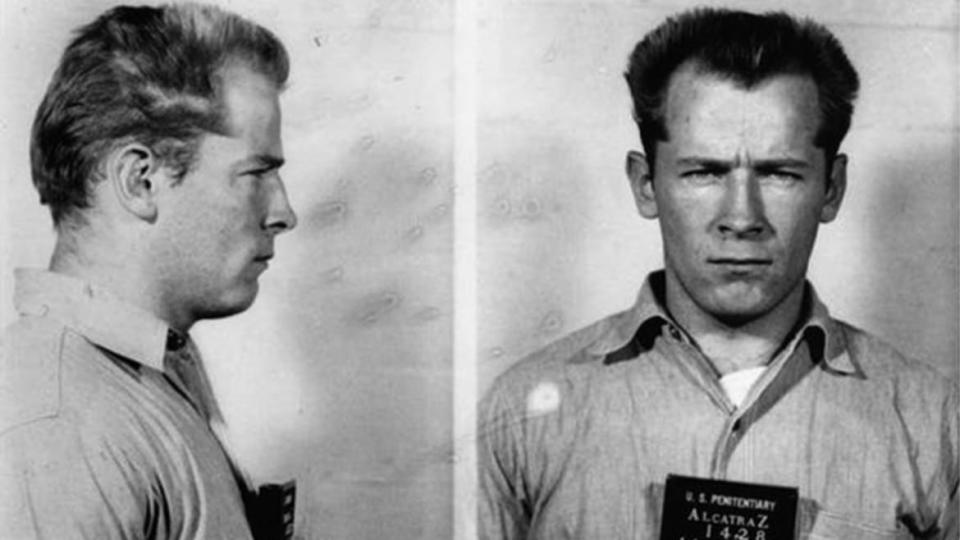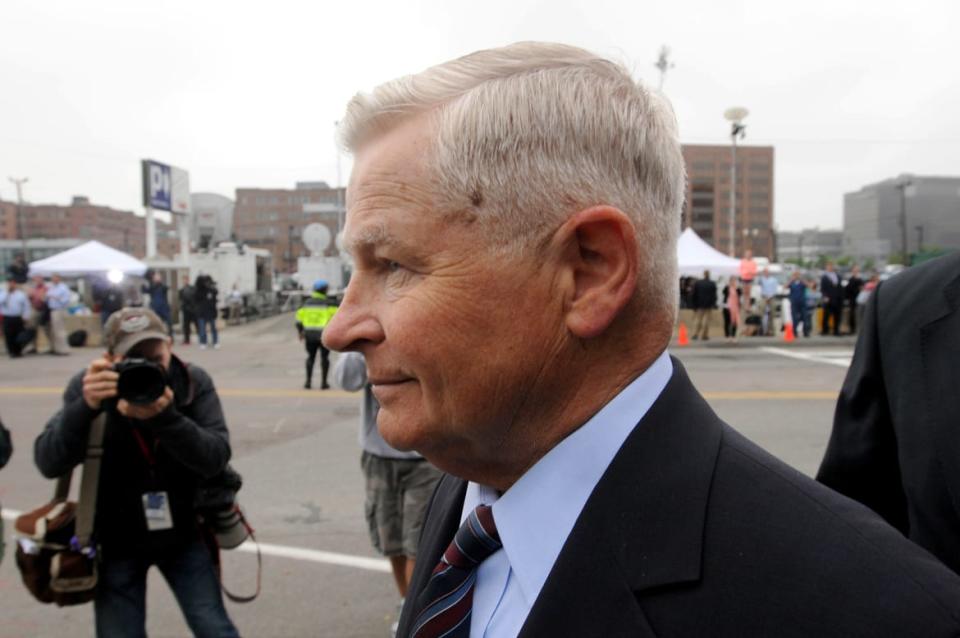A New Film Argues Notorious Gangster Whitey Bulger Was a Victim of the FBI

James Joseph “Whitey” Bulger is arguably the most notorious gangster to ever come out of Boston, and his life of crime became headline news when, in December 1994, he went on the run and landed himself on the FBI’s Ten Most Wanted list. That tale, as well as his eventual capture in Santa Monica in June 2011 at the age of 81, inspired the Johnny Depp-headlined Black Mass as well as Martin Scorsese’s Oscar-winning The Departed. Brendan J. Byrne’s new Discovery+ documentary, however, is less about Whitey’s reign of terror than it is about his sibling William Bulger, who, in a twist worthy of Hollywood, was for decades the most prominent—and arguably most powerful—politician in the state of Massachusetts.
My Name is Bulger (debuting June 17) is a story about brothers and the fragility and unreliability of reputations, and its focus is squarely on William, whose legacy has taken a significant hit thanks to Whitey. Featuring interviews with William, his wife Mary, his kids Jimmy, Dan, Bill, Kathleen and Mary, and his sister Jean, not to mention Whitey’s long-time girlfriend Catherine Greig and gangland buddy Kevin Weeks, it’s a forthright reclamation project aimed at restoring William’s status by highlighting his unimpeachable ethics, accomplishments, and character. Former governors Michael Dukakis and Bill Weld speak glowingly on his behalf, as do journalists and authors such as Jason Bowns and Matt Connolly, and the intended effect is immediately apparent: to clear the name of a public servant who rose from nothing in South Boston to defend the downtrodden, the powerless, and those men and women who were part of his beloved Irish Catholic community.
He Was Put to Death. The Real Serial Killer Roamed Free.
Born to a one-armed father whose staunch work ethic inspired him at an early age, William was one of six children, and his outgoing personality and interest in politics soon led him to campaign for a seat in the Massachusetts House of Representatives, which he won in 1960. That began a 35-year run in the legislature, 18 of which were spent as the president of the Senate—a position that Dukakis claims he held with distinction and integrity, helping to root out corruption. There were plenty of bumps along the way, though, including the 1974 Southie fight against forced busing, which Shelley Murphy of The Boston Globe strives to depict as a reasonable endeavor, despite the fact that many of the citizens opposed to busing were abusive racists who didn’t hide their hateful motivations. Frustratingly, My Name is Bulger skims past this seemingly key incident in Southie history, proving content to present the metro enclave as a warm, close-knit working-class haven where everyone had each other’s backs.

William Bulger exits John Joseph Moakley United States Courthouse following the arraignment of his brother James "Whitey" Bulger and his girlfriend Catherine Greig June 24, 2011, in Boston, Massachusetts.
As numerous relatives recount, Whitey was a loving but erratic presence in the Bulger family, appearing for days and then vanishing for months on end, and they say the result is that they had little idea what he was doing. That William isn’t asked on camera about his own knowledge of his brother’s behavior, however, feels like a conspicuous omission, and it goes hand-in-hand with My Name is Bulger’s refusal to get into the specifics of what Whitey was up to, or even what crimes he was eventually convicted of committing. As the film proceeds, many Bulgers argue that the Whitey vilified by the media and the feds was a fictional creation, but Byrne’s film nonetheless treats him as a ghostly boogeyman who’s often seen in old photographs—and in surveillance footage, doing some shady this-and-that—but rarely specifically defined.
By its conclusion, My Name is Bulger has various speakers make the case that Whitey was basically a victim, both of the FBI—who ostensibly made him out to be an informant so they could hide the fact that they’d taken his bribes—and of forces that put him in the West Virginia prison where he was murdered at the age of 89. Given that the film doesn’t truly look into the details of Bulger’s saga, it’s nearly impossible to judge the merits of these claims, leaving the proceedings stuck in a middle ground located somewhere between former associate Pat Nee, who claims that Whitey was a scary man not to be messed with, and Greig, who praises him as a kind and gentle soul who, upon arriving in California, spent an hour helping an elderly couple fix their flat tire.
Considering the cursory way in which it’s carried out, this attempted rehabilitation of Whitey Bulger feels a bit strained, and it’s designed to parallel his plight with that of his virtuous brother, whose own standing in Boston—which also included a stint as the president of the University of Massachusetts—was sullied by Whitey’s headline-making escapades. My Name is Bulger is more assured when investigating how William and Whitey’s opposite-sides-of-the-law trajectories impacted the former, casting a pall over his life’s work. Dukakis even states that he still hasn’t forgiven Governor Mitt Romney for ousting William from his UMass post after he took the Fifth during a congressional hearing about his brother.
Archival footage of William in political action conveys his good humor and the respect he earned from colleagues, and helps underscore the unfairness of judging him by his brother’s deeds. William’s daughter Mary even wonders why the Bulgers have been so tainted by Whitey’s offenses when, after 9/11, Cambridge, Massachusetts, residents were quick to make distinctions between Osama bin Laden and the relatives of his that were living among them. My Name is Bulger is interested in changing the narrative around William and his infamous brother, repositioning Whitey as both a man whose nefariousness wasn’t nearly as great as The Boston Globe or Hollywood would have you believe, and a Bulger outlier whose business was his own. Yet without a serious examination of Whitey’s heinous crimes, including being involved in at least 11 murders—which are left undiscussed precisely so those arguments will sound better—it’s hard to know what to think about the gangster. Byrne’s film is thus far more compelling when concentrating on William and his offspring, revealing a family still struggling to free themselves from their relative’s dark shadow.
Get our top stories in your inbox every day. Sign up now!
Daily Beast Membership: Beast Inside goes deeper on the stories that matter to you. Learn more.

 Yahoo Movies
Yahoo Movies 